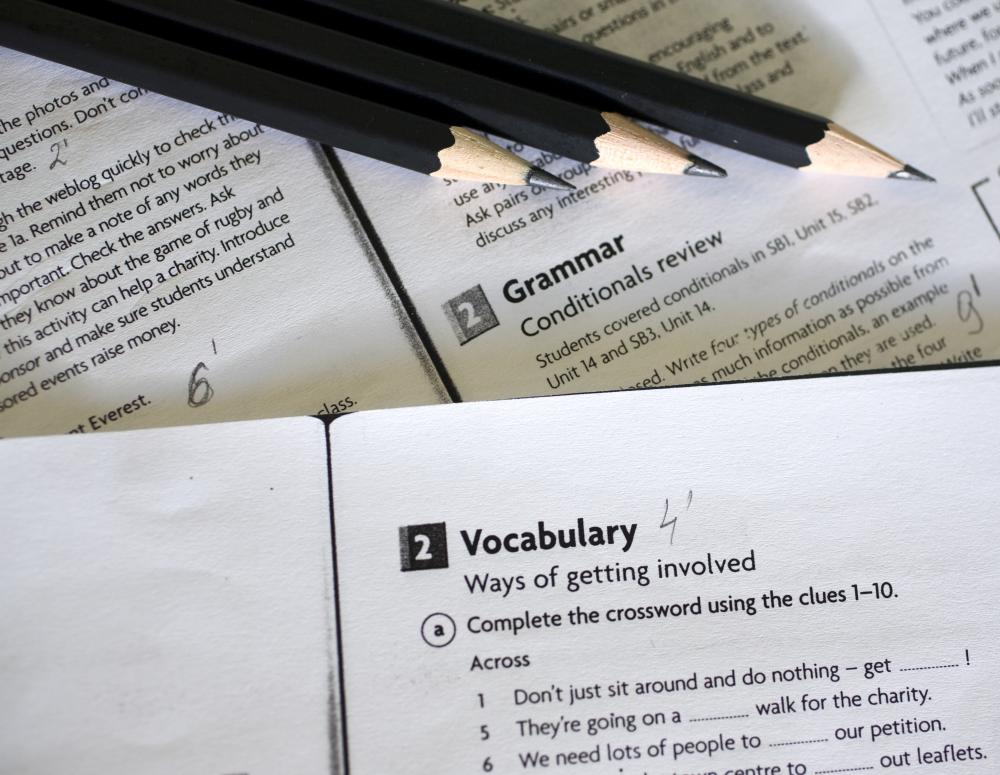At PracticalAdultInsights, we're committed to delivering accurate, trustworthy information. Our expert-authored content is rigorously fact-checked and sourced from credible authorities. Discover how we uphold the highest standards in providing you with reliable knowledge.
What Are the Different Ways to Learn English?
The different ways to learn English include both formal methods, such as classroom-focused work, and informal methods, such as watching television or attending a social event to observe how people speak the language naturally. There are also sound learning systems as well as books on English grammar. The language may be studied alone or in a group. To learn English well, a combination of speaking, listening, writing and observing is usually best.
To learn to speak English in everyday settings, direct observation of how people greet each other or what they say when ordering food in a restaurant can be helpful. Such cultural examples can help a person learn English that will often fit in better with his or her environment than the more formal lessons learned through classroom settings or from books. Classroom-based methods, however, tend to provide the basic skills on which more informal strategies can build.

Attending social events with natural English speakers who explain certain customs or ways of speaking can really give people who are learning the language helpful cultural insight. These experiences may enhance the skills and give "real life" learning to cultural events first taught to those learning English in a classroom. For instance, English learners may read about a basic event such as a birthday party in the classroom and practice relevant words such as "cake" or "wishes," but actually attending a party can bring more meaning as well as a chance to speak and listen to the related vocabulary in a natural setting.

Practicing different forms of written communication such as letters and emails with people who have English as their first language can be effective for learners. Listening to spoken English from a language course on tape and speaking the words back can help strengthen verbal learning. Once the basics needed to learn English are mastered, more advanced lessons such as those from grammar books may be undertaken.

English as a Second Language (ESL) classes that are available in many community colleges offer a group learning situation. Such formal classroom methods used to learn English can help ensure accuracy to provide a good foundation in the language. Basic English, including spoken, written and the general culture of the geographic area, is usually taught in ESL classes. ESL classes may also provide a social outlet for people new to the language to study together to practice English.
If you are looking for one-on-one instruction, hiring a Language Arts tutor is a great alternative to a group session.
AS FEATURED ON:
AS FEATURED ON:
















Discussion Comments
@Cageybird, my problem with learning a new language isn't the written material so much. I can read French and Spanish and even a little German. What I can't do is speak any of those languages. If I watch a French movie, I might recognize some of the common words and phrases, but I'm lost without the captions. I can only imagine how hard it must be to learn English without being raised to speak it. I'm an American and I still can't get all of those rules straight.
The immersion technique involves watching actual movies and television shows where native speakers use the lines described in a textbook. If the chapter is on greetings, then the student will see dozens of American actors greeting each other, either formally or informally. That's a good way to learn how to fit into different social groups, since you wouldn't say "What's up?" to your boss or "How do you do?" to your new college friends. It helps to hear English spoken naturally.
The other good thing is that you can only speak English during an immersion class. This can be intimidating at first, but it does help a student think and respond in a new language.
Post your comments